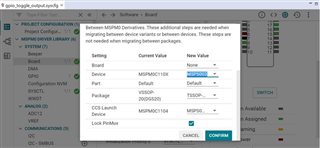Other Parts Discussed in Thread: BQ76952, MSPM0L1306, , SYSCONFIG
Dear mam,
I am using M0C1104 (TSSOP20 package) for i2c communication. In CSS,I am facing issues in reading memory location using I2c with EEPROM(M24C08) and BQ76952.
I am able to read correct data on some memory locations but on other locations I am getting garbage data.
Tested I2C SCL clock is 100khz /400Khz for EEPROM and 400 Khz for BQ76952.
Function used: I2C_ReadReg(COMMAND, RX_Data, 2);
7 bit I2C_TARGET_ADDRESS = 0x50 ( for eeprom 0xA0 >>1) and 0x08 (for bQ76952 0x10 >> 1)
#include "BQ769x2_protocol.h"
uint8_t RX_Data[4];
volatile uint8_t COMMAND = 0x0E;
int main(void)
{
SYSCFG_DL_init();
DL_SYSCTL_disableSleepOnExit();
while (1)
{
I2C_ReadReg(COMMAND, RX_Data, 2);
}
}


but we are unable to get through, we found following problem
"CORTEX_M0P: Loader: One or more sections of your program falls into a memory region that is not writable.
These regions will not actually be written to the target. Check your linker configuration and/or memory map."
Please provide us the example code of BQ76952 with MSPM0C1104 and help with what might be the problem for I2C to not work properly.
Thank You

